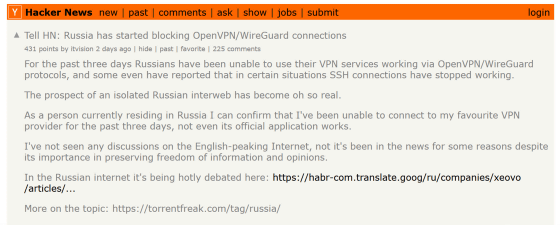Many Russian users report their experiences on social news sites about the Russian government's shutdown of VPN services

Russia has strengthened censorship in the internet space since it began its invasion of Ukraine in February 2022, and access to
Tell HN: Russia has started blocking OpenVPN/WireGuard connections | Hacker News
https://news.ycombinator.com/item?id=39067213
Access to various Western services has been blocked in Russia following the invasion of Ukraine, but some people are using VPN services to get around the block. However, as a Russian senatorsaid , ``From March 1, 2024, an order to block VPN services that provide access to sites prohibited in Russia will come into effect,'' and VPN services are becoming increasingly popular in Russia. There are also concerns that it may become unusable.
Meanwhile, itvision, a Hacker News user living in Russia, said, ``For the past three days, Russians have been unable to use VPN services that operate via the OpenVPN / WireGuard protocol, and SSH connections have stopped working under certain circumstances.'' Some people have reported that the prospect of an 'orphaned Russian Internet' has become very real. As someone who currently lives in Russia, I have been unable to connect to my favorite VPN service for the past three days and have been unable to connect to it using the official app. I can confirm that it doesn't even work. I haven't seen any discussion of this issue on the English-speaking internet. Despite its importance in protecting freedom of information and expression, for some reason it doesn't make it into the news. It's not happening,' he posted .

As a result, many users living in Russia shared their own experiences and opinions. 'Here, the Russian government has long blocked all

MrDisposable, a Russian citizen living in Russia,

In response to
In addition, MrDisposable was looking for a VPN service to replace Outline at the time of his first post, but later wrote, ``I installed AmneziaVPN on my VPS, and so far it's working well and fast. '' Did .

While there are posts that agree with itvision's report, there are also users living in Russia who claim that they have not been in a similar situation. One user wrote, 'I don't believe that to be true. The Russian government may block commercial solutions, but I'm currently using WireGuard which makes the Netherlands an exit point and it works fine. It's working,' another user replied , saying they didn't notice any problems. However, when I asked some of my friends, some of them said they were having problems with their VPN service, and it seems that the problem is not the protocol itself being blocked, but the combination of the protocol and the 'suspicious server'. I pointed out that there was.

Additionally, a person writing from Moscow via OpenVPN

The reported tightening of VPN services may be related to the large-scale demonstrations calling for the release of political activists that occurred on January 17 in the Republic of Bashkortostan in southwestern Russia. Comments were also received.
Demonstrations demanding the release of activists expand in southwestern Russia, as thousands of crowds clash with police...unprecedented since the start of the invasion: Yomiuri Shimbun
https://www.yomiuri.co.jp/world/20240118-OYT1T50232/
Related Posts:
in Web Service, Posted by log1h_ik







